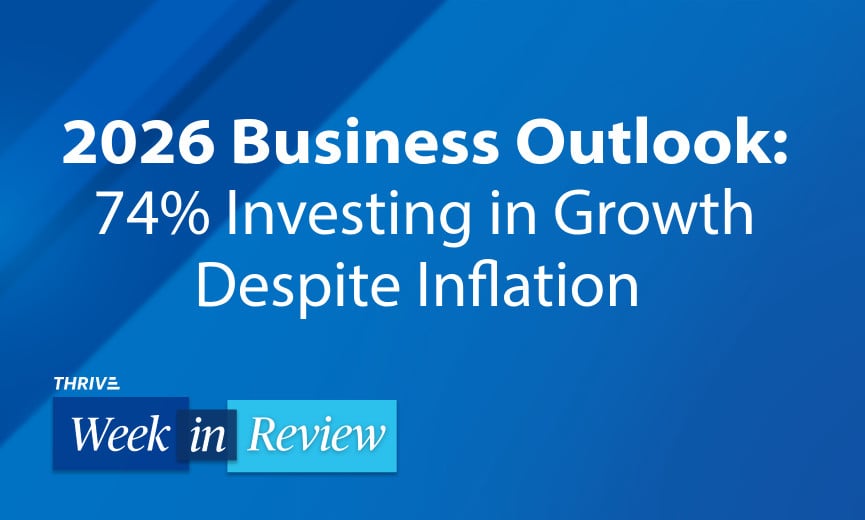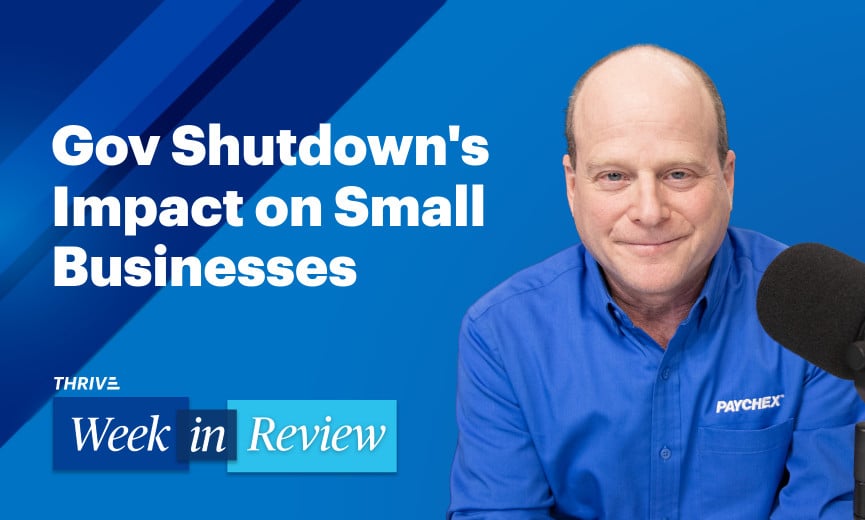- Thrive
-
Season
5Episode68
Businesses Optimism and Uncertainty, Manager Training Lags, AI Job Swap
Podcast •
Watch
Summary
Labor quality and unfilled job openings haven’t dampened employer optimism, and the latest Small Business Optimism Index shows as much. In fact, host Gene Marks says the 12-point drop on the uncertainty index gives hope for a better year ahead. Among the unfilled jobs are those for manager, as a lack of training has turned off many employees from seeking those roles. Gene says this is a good time for businesses to re-evaluate their career pathing process. Also, three in 10 firms say that are pushing for AI to replace humans next year in some industry sectors. Which ones?
Additional Resources
Check out how Paychex helps businesses
Read our AI for Small Businesses Sentiment Report
View Transcript
Hey everybody, it's Gene Marks, and welcome to this week's episode of the Paychex THRIVE Week in Review. This is where we take a few items from the news this week that impacts your small business, and mine and we talk about it just a little bit.
The first item of the news has to do with optimism. The National Federation of Independent Businesses had their monthly survey and said that small business optimism takes a small step back as uncertainty eased in October.
In October of 2025, the NFIB Small Business Optimism Index dropped a little bit, but it still remained above its 52-year average. Meanwhile, the uncertainty index dropped significantly – by 12 points – to 88, its lowest reading of the year, signaling that small business owners feel more certain about the near-term future.
Key concerns include labor quality, unfilled job openings that they couldn't fill, as well as sales and profit trends. They weakened a little bit in this past month. Price hike intentions also cooled. Only a net 21% of those surveyed said that they raised prices – that's down 3% – and 30% plan to raise them in the next three months. That's also down 1%.
So, uncertainty itself has eased a little bit. Small businesses are feeling a little bit more optimistic as we head into the new year.
The next item of news is a really interesting story from Fast Company. The title of the story is “Nobody Wants to Be a Boss Anymore – And Here's Why in Just Seven Words.” A survey by LinkedIn of more than 10,000 users, according to Fast Company, found that only 30% of workers want to become managers in the next few years, despite nearly seven in 10 saying they'd leave a job if they had a bad manager.
One big reason: Many organizations promote individuals into management roles without adequate training. For example, consulting firm West Monroe found that 66% of managers received eight hours or less of training, and of those newly promoted 43% received no training at all.
The article argues that the core problem is skill mismatch. Success as an individual contributor, like closing deals or delivering output, doesn't translate to success as a manager, like coaching others and emotional intelligence and creating clarity. It presents the framework from the book, “The Leadership Pipeline,” moving from leading self into leading others into leading leaders requires major behavioral change.
So, how do you fix this? Well, according to the article, companies map leadership transitions clearly, offer tailored training at each stage, schedule time for new managers to learn, provide mentorship, measure outcomes like team engagement and turnover and conflicts, and senior leaders have to model emotionally intelligent behavior.
So, being a manager isn't all that it is cracked up to be, but that's some good advice about how to try to groom your managers, your employees to become future management and future leaders. I thought that was really cool stuff.
By the way, also cool stuff has to do with management, as well. I want to pause this conversation for just a moment and share a surprising stat with you. Did you know that 34 percent of business owners told Paychex that they spend over 10 hours a week on HR tasks. And it's easy to see why. The hiring, onboarding, benefits, compliance – it's a lot to handle, especially considering that news about difficulties and finding and training frontline workers, right?
So, imagine if you could clone yourself to handle all of this. Sounds like a dream, right? That's where Paychex comes in. From finding the right people to streamlining their first day and even helping you manage benefits and compliance along the way, it's like having an entire HR team that works just the way you need. So, take a moment after this and check out paychex.com/meetpaychex. That's P-A-Y-C-H-E-X dot-com forward slash M-E-E-T-P-A-Y-C-H-E-X. You can also find the link in our show notes.
Okay, let's get back to things. Where were we? Oh yeah, we were talking about workers. Here's some not so great news for some workers.
Three in 10 firms plan to replace workers with AI next year, according to a survey. This was reported in CFO Dive. About 30% of U.S. companies say they plan to automate roles and replace employees with artificial intelligence during the next year, according to a survey of 1,250 business leaders conducted by AllResumeBuilder.com.
Among those, 59% expect AI to replace at least 10% of their workforce, and about 10% believe AI could replace 50% or more. The sectors most frequently pointed to at risk includes IT, financial services, accounting, and human resources.
While some companies view AI purely as a cost-cutting tool, others see the opportunity to shift human roles toward more strategic work, though this requires planning on workforce skills and change management. The article in CFO Dive underscores the need for business leaders, especially CFOs, to rethink how people can add value when automation increases instead of simply seeing workers as replaceable.
So, do you think you'll be replacing your employees with AI next year? I don't think I'm anywhere near that stage right now, but I can understand some companies in certain industries, particular software development and customer service, leaning on AI to do a lot more in lieu of their employees doing it.
You've been watching this week's episode of the Paychex THRIVE Week in Review. My name is Gene Marks. If you'd like any tips or advice or help in running your business, sign up for our Paychex THRIVE newsletter. Go to paychex.com/thrive and you'll get all the help that you need.
Thanks so much for watching or listening. We'll see you again next week. Take care.
Do you have a topic or a guest that you would like to hear on THRIVE? Please let us know. Visit payx.me/thrivetopics and send us your ideas or matters of interest. Also, if your business is looking to simplify your HR payroll benefits or insurance services, see how Paychex can help. Visit the resource hub at paychex.com/worx. That's W-O-R-X. Paychex can help manage those complexities while you focus on all the ways you want your business to thrive.
I'm your host, Gene Marks, and thanks for joining us.
This podcast is property of Paychex, Incorporated 2025. All rights reserved.

 Apple Podcast
Apple Podcast Spotify
Spotify iHeartRadio
iHeartRadio









